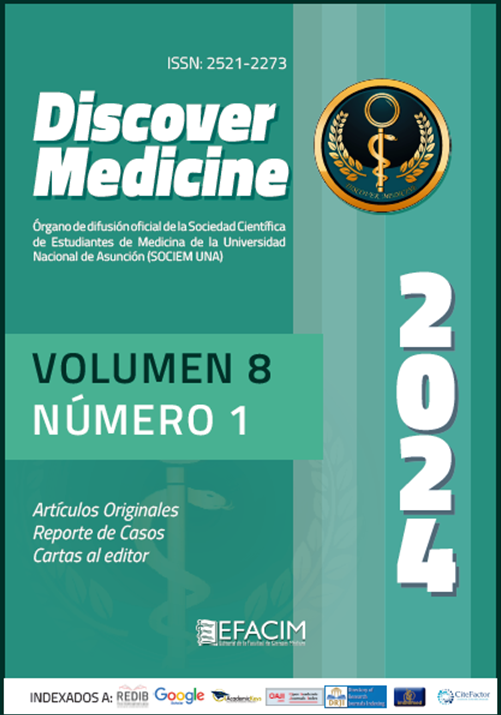Abstract
Background: Despite its prevalence and significant health consequences, there is considerable variability in knowledge and attitudes towards DM in the general population. A good understanding of the disease and positive attitudes towards its management are crucial for effective prevention and control. Objective: To assess knowledge and attitudes towards diabetes mellitus in the general population in Paraguay, 2024. Methodology: Observational, descriptive and prospective study. It was carried out in Paraguay during May 2024. Non-probabilistic convenience sampling was used. An online survey designed specifically for this study was used. The survey included structured and semi-structured questions to identify knowledge, attitudes and variables of interest. Data were analysed using descriptive statistics. Results: The sample included 186 participants, with a mean age of 42 years (SD = 15.611), with a slight female predominance (55.9%). It was found that 32.3% of the participants did not identify any common risk factors associated with the disease. 41.9% of participants reported perceiving some degree of stigma towards patients with this chronic condition. Conclusion: This study reveals gaps in knowledge and attitudes towards diabetes mellitus among Paraguayan adults. One third did not identify risk factors, and a high perception of stigma was evident. Educational interventions focused on prevention and stigma reduction are crucial to improve the understanding and management of diabetes in Paraguay.
References
Dilworth L, Facey A, Omoruyi F. Diabe- tes Mellitus and Its Metabolic Complications: The Role of Adipose Tissues. Int J Mol Sci. enero de 2021;22(14):7644.
Smokovski I. Burden of Diabetes Prevalen- ce. En: Smokovski I, editor. Managing Diabetes in Low Income Countries: Providing Sustainable Dia- betes Care with Limited Resources [Internet]. Cham: Springer International Publishing; 2021 [citado 15 de junio de 2024]. p. 1-12. Disponible en: https:/doi. org/10.1007/978-3-030-51469-3_1
Teo ZL, Tham YC, Yu M, Chee ML, Rim TH, Cheung N, et al. Global Prevalence of Diabetic Retino- pathy and Projection of Burden through 2045: Syste- matic Review and Meta-analysis. Ophthalmology. 1 de noviembre de 2021;128(11):1580-91.
Mezil SA, Abed BA. Complication of Diabetes Mellitus. Ann Romanian Soc Cell Biol. 22 de marzo de 2021;1546-56.
Kropp M, Golubnitschaja O, Mazurakova A, Koklesova L, Sargheini N, Vo TTKS, et al. Diabetic re- tinopathy as the leading cause of blindness and early predictor of cascading complications—risks and mi- tigation. EPMA J. 1 de marzo de 2023;14(1):21-42.
Ling W, Huang Y, Huang YM, Fan RR, Sui Y, Zhao HL. Global trend of diabetes mortality attribu- ted to vascular complications, 2000–2016. Cardio- vasc Diabetol. 20 de octubre de 2020;19(1):182.
Lim SC, Mustapha FI, Aagaard-Hansen J, Calopietro M, Aris T, Bjerre-Christensen U. Impact of continuing medical education for primary healthcare providers in Malaysia on diabetes knowledge, attitu- des, skills and clinical practices. Med Educ Online. 1 de enero de 2020;25(1):1710330.
Hurst CP, Rakkapao N, Hay K. Impact of diabetes self-management, diabetes management self-efficacy and diabetes knowledge on glycemic control in people with Type 2 Diabetes (T2D): A mul- ti-center study in Thailand. PLOS ONE. 31 de diciem- bre de 2020;15(12):e0244692.
Pal R, Yadav U, Grover S, Saboo B, Verma A, Bhadada SK. Knowledge, attitudes and practices towards COVID-19 among young adults with Type 1 Diabetes Mellitus amid the nationwide lockdown in India: A cross-sectional survey. Diabetes Res ClinPract. 1 de agosto de 2020;166:108344.
Elafros MA, Callaghan BC, Skolarus LE, Vilei- kyte L, Lawrenson JG, Feldman EL. Patient and health care provider knowledge of diabetes and diabetic mi- crovascular complications: a comprehensive litera- ture review. Rev Endocr Metab Disord. 1 de abril de
;24(2):221-39.
Alam S, Hasan MK, Neaz S, Hussain N, Hos-
sain MF, Rahman T. Diabetes Mellitus: Insights from Epidemiology, Biochemistry, Risk Factors, Diagnosis, Complications and Comprehensive Management. Diabetology. junio de 2021;2(2):36-50.
Subramaniam M, Abdin E, Bhuvaneswari S, AshaRani PV, Devi F, Roystonn K, et al. Prevalence and Correlates of Social Stigma Toward Diabetes: Re- sults From a Nationwide- Survey in Singapore. Front Psychol [Internet]. 9 de julio de 2021 [citado 15 de junio de 2024];12. Disponible en: https:/www.fron- tiersin.org/journals/psychology/articles/10.3389/ fpsyg.2021.692573/full
AshaRani PV, Abdin E, Kumarasan R, Kumar FDS, Shafie S, Jeyagurunathan A, et al. Study protocol for a nationwide Knowledge, Attitudes and Practices (KAP) survey on diabetes in Singapore’s general popu- lation. BMJ Open. 1 de junio de 2020;10(6):e037125.
Hill-Briggs F, Adler NE, Berkowitz SA, Chin MH, Gary-Webb TL, Navas-Acien A, et al. Social De- terminants of Health and Diabetes: A Scientific Re- view. Diabetes Care. enero de 2021;44(1):258-79.
Singer ME, Dorrance KA, Oxenreiter MM, Yan KR, Close KL. The type 2 diabetes ‘modern pre- ventable pandemic’ and replicable lessons from the COVID-19 crisis. Prev Med Rep. 1 de febrero de 2022;25:101636.
Pillen H, Ward PR. How might diabetes orga- nisations address diabetes-related stigma? Findings from a deliberative democratic case study. Health Expect. 2022;25(5):2213-22.
Hunt D, Lamb K, Elliott J, Hemmingsen B, Slama S, Scibilia R, et al. A WHO key informant lan- guage survey of people with lived experiences of diabetes: Media misconceptions, values-based mes- saging, stigma, framings and communications consi- derations. Diabetes Res Clin Pract. 1 de noviembre de 2022;193:110109.
Banasiak K, Cleary D, Bajurny V, Barbieri P, Nagpal S, Sorensen M, et al. Language Matters – A Diabetes Canada Consensus Statement. Can J Diabe- tes. 1 de julio de 2020;44(5):370-3.
Zhu X, Lee M, Chew EA, Goh LJ, Dong L, Bart- lam B. “When nothing happens, nobody is afraid!” beliefs and perceptions around self-care and heal- th-seeking behaviours: Voices of patients living with diabetic lower extremity amputation in primary care. Int Wound J. 2021;18(6):850-61.

This work is licensed under a Creative Commons Attribution-NonCommercial-NoDerivatives 4.0 International License.
Copyright (c) 2024 Myrian Aidet Colmán Gómez, Micaela Yanina Pintos Müller, Carmen Noemí Burgos Espinola, Diego Ariel Velazquez Villasanti
